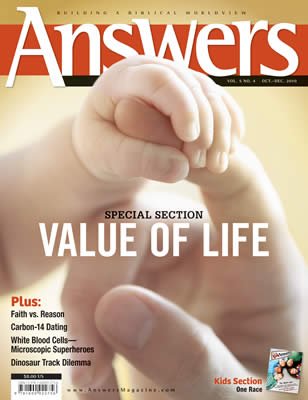Rubber Chicken Leg
What makes bones so strong? If they were made out of minerals alone, they would be too brittle and break. The key is the extra flexible ingredient, added by God. Try this simple experiment, and you can see for yourself!
You have probably heard that you should drink milk because it builds strong bones. This is true because milk and other dairy products are good sources of calcium, which is necessary for strong bones. Studies have shown that children ages 3–13 who don’t drink milk break their bones more easily. But as we will see, it takes much more than calcium to make strong bones.
Calcium adds strength to bones because it is a mineral. Minerals are naturally occurring chemical elements and compounds that are solid and crystalline (made of orderly crystals). In bones, calcium is combined with the elements phosphorus, hydrogen, and oxygen to form a very hard crystal called hydroxyapatite.
But strong bones require more than hardness. If bones were made out of pure hydroxyapatite (like the enamel of our teeth) they would be very hard but brittle and would actually fracture more easily.
A Mix of Hard and Flexible Parts
Bones absorb blows so well because they are constructed of a mixture of hard mineral and tough, flexible fibers. These fibers allow the bone to flex under impact without shattering.
Engineers call such mixtures composite materials. Composites can be much stronger than the individual materials they are made of. For example, fiberglass is stronger than glass by itself, and reinforced concrete is stronger than cement alone. Both are examples of composite materials designed by man, but these do not begin to compare with the structural complexity and beauty of bones.
The dry weight of bone is about 70% mineral (mostly hydroxyapatite) and 30% nonmineral (mostly a protein called collagen). Collagen is a tough, fibrous protein that we are most familiar with in the form of leather. This combination of hard mineral and tough but flexible collagen gives bone its great strength.
Pound-for-pound, bone is said to be as strong as cast iron. It’s hard to imagine how much stress our bones endure each day. When a 200-pound (90.7 kg) person is running on a hard surface, for example, the hip joint endures forces up to 600 pounds of pressure. But our divinely designed bones take this kind of stress in stride every day.
God, the creator of bones, has rightly been called the Great Engineer.

See For Yourself . . .
The Rubber Bone Experiment
What do you think our bones would be like without any mineral? You can see for yourself by doing an easy (even tasty!) experiment. First, you must eat all the meat off a chicken drumstick, which is actually the tibia and fibula of the chicken’s leg. Then put the chicken tibia (the larger bone) in a small jar filled with enough vinegar to completely cover the bone. Cover the jar and let it sit for two weeks.
When you remove the bone from the vinegar after two weeks, you will find that it has become so flexible you will be able to tie it into a knot! What happened? Vinegar contains an acid (acetic acid) that completely dissolves any mineral in the bone, leaving the flexible organic material, which is 95% collagen. You have essentially produced a leather bone. Imagine what it would be like if all the bones in your body were like this, and then thank God for the mineral in your bones.

The Brittle Bone Experiment
Now you might wonder what bones would be like if you could remove all the organic (carbon-containing) collagen and leave only the mineral. For this you will need another chicken leg (tibia) and the supervision of an adult. Have an adult fire up a charcoal grill until the coals are glowing, and then place the bone directly on the coals. Allow the bone to turn into ash in the fire. This will burn up the organic material, leaving only the mineral.
When this bone is removed from the coals (by an adult) and allowed to cool, it will be so brittle that it is easily broken by tapping it on a hard surface. If our bones were like this, one fall could break nearly every bone in our body.
We can only marvel at the handiwork of God, who created such an engineering masterpiece as our bones.
Answers Magazine
October – December 2010
Human life is sacred, from fertilization until the day we die. This issue focuses on a creation-based understanding of the sanctity of life and mankind’s violation of the Creator’s clear directives.
Browse IssueRecommended Resources

Answers in Genesis is an apologetics ministry, dedicated to helping Christians defend their faith and proclaim the good news of Jesus Christ.
- Customer Service 800.778.3390
- Available Monday–Friday | 9 AM–5 PM ET
- © 2026 Answers in Genesis




